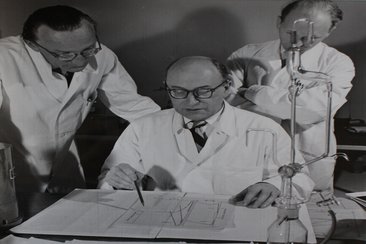
How has nuclear medicine developed as a scientific field in Austria and worldwide? Which role did interdisciplinary and international cooperation play?
The Division of Nuclear Medicine cordially invites you to a two-day conference, organized in collaboration with the Austrian Academy of Sciences (ÖAW), the Friedrich-Alexander-University Erlangen-Nuremberg (FAU), and the Austrian Society of Nuclear Medicine and Molecular Imaging (OGNMB).
Please finde more infos here.
Organizers: Johannes Mattes (ÖAW) | Cécile Philippe (MedUni Vienna) | Maria Rentetzi (FAU)
Nuclear research in medicine relies on a high degree of interaction. While the production of radioisotopes and the development of medical devices are carried out by physicists and engineers, chemists and pharmacists take over the syntheses of radiopharmaceuticals, while physicians focus on their application. In the absence of handbooks, industrially available devices, and radioisotopes, early specialists were also dependent on multilateral exchanges. These were fostered by post-war agreements for the peaceful use of atomic energy and international organizations such as the IAEA and WHO.
Thus, the formation of nuclear medicine as discipline was the result of a global balancing and standardization process during the Cold War era. Its origins are traced in the first broad clinical applications of radioisotopes primarily in the United States and the United Kingdom just before the Second World War and continued with the worldwide dissemination of relevant knowledge and techniques that were mainly triggered by the United Nations international organizations. Nevertheless, in many countries, nuclear medicine did not get recognized as a medical specialty with separate residency training until the 1990s.
This symposium focuses on the emergence of nuclear medicine as an outcome of scientific collaboration and competition, boundary and interdisciplinary work, and encounters between various (inter)national stakeholders, as well as political, diplomatic, and scientific institutions. Contributions by eminent scholars from Canada, Europe and East Asia will explore the scientific, political, diplomatic and social dimensions of these interactions, the knowledge, resources and policies involved.
Programm
MONDAY, 20 March 2023
Jugendstil Hörsaal, MedUni Vienna
5:00 pm
Opening Cerenomy
Welcome by the Conference Organizers:
Johannes Mattes | ÖAW – Cécile Philippe | MedUni – Maria Rentetzi | FAU
President of the Commission for the History and Philosophy of Sciences & emeritus Professor of Anatomical Pathology:
Helmut Denk | ÖAW, MedUni Graz
Director of the Institute of Culture Studies and Theatre History:
Johannes Feichtinger | ÖAW
Head of the Division of Nuclear Medicine:
Marcus Hacker | MedUni
Nuclear Medicine Pioneer & emeritus Head of the University Clinic of Nuclear Medicine:
Rudolf Höfer | MedUni
-
6:00 pm
Welcome Reception in honor of the 100th Birthday of Professor Rudolf Höfer
Laudator & Professor of Internal Medicine:
Michael Weissel | MedUni
Sparkling wine & buffet
-
7:00 pm
Guided Tour through the facilities of the Division of Nuclear Medicine, MedUni Vienna
________
TUESDAY, 21 March 2023
Johannessaal, Academy main building, Ignaz-Seipel-Platz 2, Austrian Academy of Sciences
8:30 am
Get-together over coffee and tea
-
9:00 am
Introductory Words by the Organizers
Johannes Mattes | ÖAW – Cécile Philippe | MUW – Maria Rentetzi | FAU
-
9:10 am
Session One: Discipline-Building Technologies and Institutions
Chair: Gabriella Ivan | IAEA Archives
Hsiu-yun Wang | National Cheng Kung University, Tainan, Taiwan
"Going Nuclear with Colonial Legacy: Dr. Kao Tien-Cheng and Radioactive Iodine in Taiwan, 1950s-1960s"
Loukas Freris | FAU Erlangen-Nuremberg, Germany
"“A Peaceful Bomb”: radiotherapy and the emergence of a new professional identity in Greece (1959-1978)"
Johannes Mattes | University of Oslo, Norway / Austrian Academy of Sciences &
Cécile Philippe | Medical University of Vienna
"Distinction matters: Therapeutic Isotopes, Imaging Technologies, and Discipline Building of Nuclear Medicine in Cold War Europe"
-
11:30 am Lunch Break
-
12:40 pm
Session Two: Political, Social, and Gendered Aspects of Knowledge and Technology Exchange
Chair: Wolfgang Wadsak | OGNMB
Maria Rentetzi | FAU Erlangen-Nuremberg, Germany
"Diamonds, x-rays, and colonialism: How x-rays moved from the medical practice to the diamond mining industry and back"
Sandra Klos | Austrian Academy of Sciences, Vienna
"The role of women in early nuclear medicine. Some preliminary findings and discussion points"
Mohamed Elsayed | FAU Erlangen-Nuremberg, Germany
"Ionizing Radiation in Medicine Under War: Trafficking Medical Radiological Equipment to Ukraine's War Zone"
Kapil Patil | FAU Erlangen-Nuremberg, Germany
"Building a “Mini Mayo Clinic”: Peaceful Atoms, Technical Assistance, and the Evolution of Radiation Medicine Center in India"
-
3:00 pm Coffee Break
Drinks, canapes and sweets
-
3:30 pm
Session Three: Safety Issues, Radiation Protection, and the Pharma Industry
(hybrid session)
Chair: Maria Rentetzi | FAU
Kaori Iida | Graduate University for the Advanced Studies, SOKENDAI, Hayama, Japan (online)
"Nuclear Medicine and the Bombs: How the new field was developed in Japan and in whose bodies"
Hein Brookhuis | KU Leuven & SCK CEN, Belgium (online)
"From Big Science to Big Pharma – the development of nuclear medicine at the Belgian Nuclear Research Centre (1990 – 2020)"
Mahdi Khelfaoui | Université du Québec à Trois-Rivières, Canada (online)
"Tracing the uses of isotopes in scientific and medical communities (1913–1965): A bibliometric approach"
Aske Hennelund Nielsen | FAU Erlangen-Nuremberg, Germany
"From Radiology to a World-In-Crisis: Rolf Sievert and the re-orientation of the International Radiation Protection Commission in the Post-War Period"
-
5:50 pm Short Break
-
6:00 pm Concluding Discussion